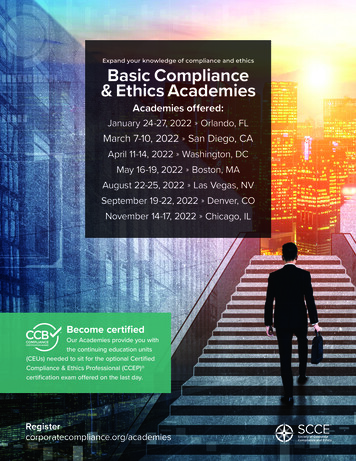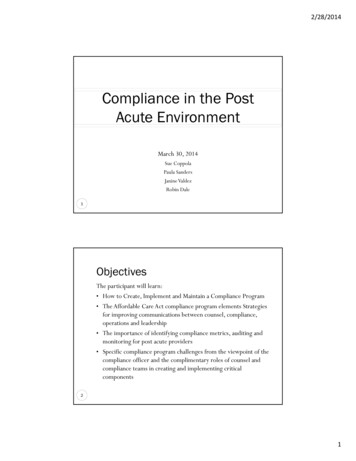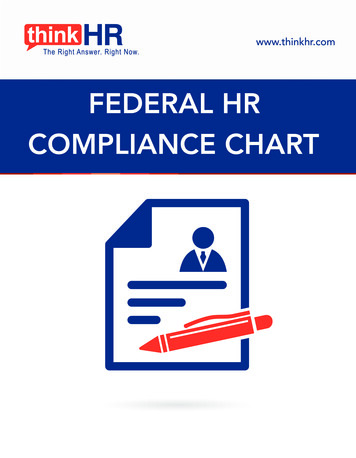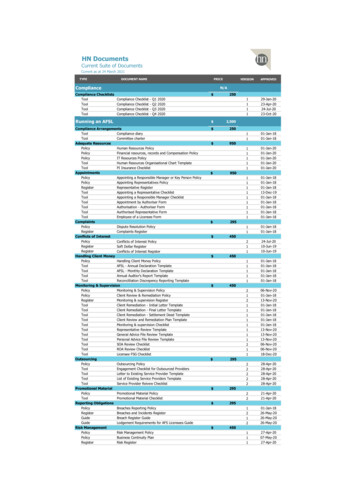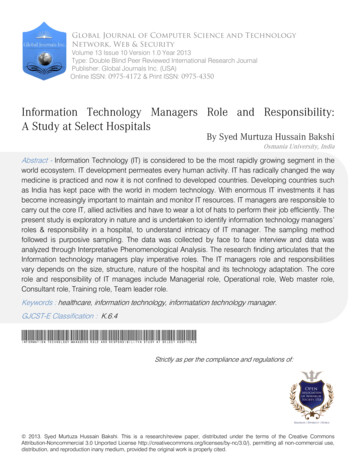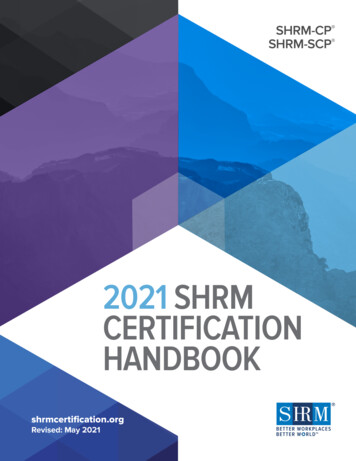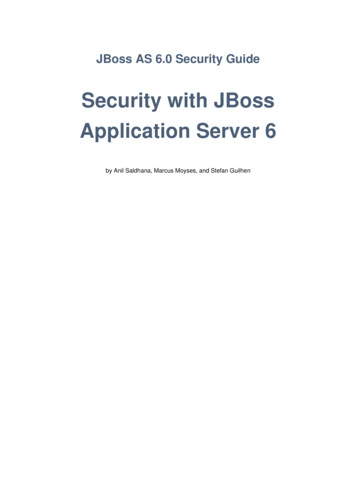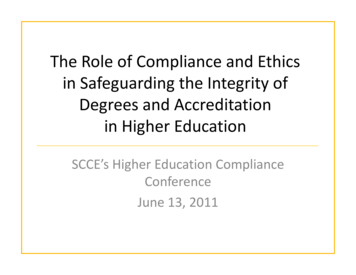
Transcription
The Role of Compliance and Ethicsin Safeguarding the Integrity ofDegrees and Accreditationin Higher EducationSCCE’s Higher Education ComplianceConferenceJune 13, 2011
Rhonda L. Bishop, CCEPChief Compliance and Ethics OfficerUniversity of Central FloridaJennifer L. Burruss, CCEPInterim University Compliance OfficerVirginia Commonwealth UniversityEllie A. Fogarty, CCEPVice PresidentMiddle States Commission on Higher EducationDisclaimer:The content of this presentation does not necessarily represent or reflectthe views of the organizations with whom the presenters are affiliated.
University of Central Florida Nation's second-largest university located in Orlando, FL 12 colleges including the newly established College of Medicine More than 56,000 students in 216 degree programs Academic and research leader in optics, modeling and simulation,engineering and computer science, business administration,education, science, hospitality management and digital media Carnegie Foundation designations “Research University, HighResearch Activity” , “Curricular Engagement,” and “Outreach andPartnerships”
Virginia Commonwealth University VCU Rams made it to the NCAA 2011 Final Four in Houston, TX Located on two downtown campuses in Richmond, VA School of the Arts located in Qatar Carnegie Foundation designation “Research University, Very High ResearchActivity” More than 32,000 students in 211 certificate and degree programs in the arts,sciences and humanities VCU Medical Center is a nationally recognized leading academic medical center andthe region’s only Level 1 Trauma Center More than 18,000 faculty, staff and hourly employees, including 1,927 full-timeinstructional faculty and 8,586 classified staff, make VCU and the VCU HealthSystem the city’s single largest employer
Middle States Commission onHigher Education Located in Philadelphia, PA MSCHE is a voluntary, non-governmental, membership associationthat is dedicated to quality assurance and improvement throughaccreditation via peer evaluation Accredits over 500 degree-granting colleges and universities in NY,NJ, PA, DE, DC, MD, Puerto Rico, and the US Virgin Islands One of 6 regional accrediting agencies throughout the US Recognized by the U.S. Secretary of Education as a reliable authorityconcerning the quality of the education offered by the institutions ofhigher education we accredit
Overview Recent degree scandals, lessons learned and whatcompliance and ethics professionals need to know Leveraging compliance and ethics activities todemonstrate institutional effectiveness and theintegrity of the degree granting and accreditationprocess Gaining recognition for compliance and ethicsprograms and meeting accreditation agencyexpectations for program assessment
Major Degree Scandals in 2008
Universities Involved Virginia Commonwealth University West Virginia University Carnegie Mellon University
BACKGROUNDFirst Identification ofStudent Name by the Media9
Virginia Commonwealth University Failure to obtain 30 credit hours in residence No exception to that requirement was requestedor approved Student afforded preferential treatmentthroughout the degree granting process More than one employee overlooked ordisregarded institutional policies and procedures President’s name invoked in allegations
VCU Findings Investigation of over 15,000 degrees demonstratedonly two degrees did not meet residency requirement VCU met all SACS requirements for policies andprocedures Investigation found no systemic failures Identified opportunities to strengthen process Two university deans resigned and a faculty memberprovided with a letter of counsel and caution
VCU Corrective Actions Revised degree revocation policy Strengthened language on graduation application form Communication of student’s responsibilities tounderstand and satisfy graduation requirements Developed transfer and advising manual Developed degree audit function and registrar audit Code of Ethics, Creed and Code of Conduct training Compliance and Audit added annual reviews to workplan
West Virginia University Awarded a retroactive degree to a formerexecutive MBA student due to uncertaintysurrounding the student’s records Records later proved to include thefalsification of grades Provost and dean of the business schoolresigned Later in June of 2009 the president resigned
Carnegie Mellon University Error in judgment involving the approval ofexcessive transfer credits and excessive unitsfor independent study in lieu of course workfor a student who received a master’s degree Dean of the Heinz School of Public Policy andManagement resigned
LINKS TO KEY DOCUMENTS VCU Report to SACS:http://www.provost.vcu.edu/pdfs/SACS REPORT 9-5.pdf JLARC Report:http://jlarc.state.va.us/reports/Rpt373.pdf WVU sulting%20Final%20Official%20Report.pdf15
Integrity of Degreesand Degree ProgramsConducting Compliance Audits of theDegree Granting Process
Why It Matters Failures in the degree granting process and inmeeting accreditation requirements mayresult in Loss of accreditation Sanctions Adverse actions for the university Risks to reputation and loyalty to the university Loss of eligibility to receive Federal Title IV funds
Why perform compliance audits? Issuance of degrees is a university’s “main product” Elevate the importance of the integrity of theuniversity’s degree granting process Address complacency with the degree granting andaccreditation processes and periodic assessments Promote monitoring at each step in the process Raise awareness of accountability and responsibility
Areas to audit Admissions Transfer of credits Advising Grading, program and degree requirements Graduation application, degree audit andaward
Questions to ask? Do we have the appropriate policies covering each of these areas? Do our students understand they are responsible for knowing our academicpolicies and procedures? Do our faculty know and understand our academic policies and procedures? Do our advisors know and understand our academic policies andprocedures? Does our graduation application require each signatory to certify that theinformation is correct and that the student met both university andprogram requirements? Do we have a policy to revoke a degree for any reason?
Questions to ask? Do faculty, staff and advisors receive training? What is included in review of the graduation application? What is the procedure when a problem or mistake is identified? Is there a policy and procedures for the timely notification and subsequentevaluation and resolution of degree issues and revocation of degrees?When do we contact the following:– Dean– Provost– President– Governing Board! Do we conduct monitoring at each step?
Admissions All degree program admission processes meetoverarching university standards Test sample meets university and program policies andprocedures Admission decision process documented and maintainedaccording to requirements Most importantly - Admission process conducted withoutbias or influence at both the university and program level Conduct interviews
Transfer of credits Transfer policies and procedures:– Documented– Easily accessible– Communicated– In compliance with accreditation requirements– Consistently applied Exceptions documented and approved Test sample meets university and program policiesand procedures
Advising Advising policies and procedures– Documented– Easily accessible– Communicated– Consistently applied Advisors are trained and understand the importance of documentingexceptions/waivers/substitutions Test sample from advising file demonstrates appropriate approvals anddocumentation Student’s “official” student record matches program files! Important that “degree audits” are conducted early enough forstudents to take additional courses if audits are used duringadvising process
Grading, Program and DegreeRequirements Grade change/appeal policy:– Documented– Accessible– Communicated– Consistently applied Test sample:– appropriate approvals for changes, exceptions, waivers,substitutions– Program requirements consistent with universityrequirements and appropriately approved– Recommend conducting interviews with faculty and staff
Graduation Application, Auditand Award Language on graduation application communicates responsibilityand accountability Application is complete and accurate Appropriate signatures are present Degree audit conducted Information on degree application matches “official” student record– any discrepancies addressed appropriately Correct degree conferred!Failure to perform due diligence and confusion overresponsibility/accountability increases the risk of improperlyawarding a degree
Every compliance and ethics officer shouldhave a good understanding of the degreegranting process and the accreditation processat their institution including any relatedpolicies, procedures or external requirements.If a university encounters issues in either ofthese areas .nothing else matters!
Compliance Audit of InternalAssessment for Accreditation
Philosophy of Accreditation The university is engaged in an ongoingprogram of improvement and is able todemonstrate how well it fulfills its mission The university is expected to document thequality and effectiveness of all its programsand services
Fundamental Characteristics ofAccreditation Accreditation requires institutional commitment andengagement Accreditation requires institutional commitment tothe concept of quality enhancement throughcontinuous assessment and improvement Chief Executive Officer (President) must certifycompliance with accreditation standards
Benefits of Accreditation Provides assurance for the integrity and quality ofthe university’s degree granting programs Accreditation demonstrates accountability Reputation of quality, high standards and the abilityto improve Federal government requires accreditation for auniversity to receive Federal Title IV funds
Compliance Audit of InternalAssessment for Accreditation Compliance audit of internal assessment tomeet accreditation requirements provides Assurance that the university is committed to theprinciple of integrity in the governance andoperation of the university Necessary control to protect the university’saccreditation
Questions to ask? Who has responsibility for the accreditationprocess? Where are we in the accreditation cycle? Does a time line exist? What process is in place to manage theaccreditation life cycle (e.g. collection of data)?
Questions to ask? Were concerns raised during the lastassessment? If yes, have they beenaddressed? Are all processes documented? Are sufficient resources allocated toaccreditation? Most importantly, is accreditation a priority ?
Compliance Audit of InternalAssessment for Accreditation Compliance audit evaluates the university’scompliance with accreditation requirementsand standards including the university’s Commitment to accreditation principles,requirements and standards Evaluation of its mission statement to determinewhether it accurately reflects its values,aspirations, mandates and commitments toconstituent groups
Compliance Audit of InternalAssessment for Accreditation Compliance audit evaluates (cont.) Institutional goals, programs and services and theextent they are in alignment with the university’smission Compliance with accreditation principles inevaluating the university’s programs, operationsand services
Compliance Audit of InternalAssessment for Accreditation Compliance audit evaluates (cont.) Level of performance and whether it challengesthe university to move beyond the status quo orbeyond minimal compliance requirements Commitment to the concept of accreditation as anongoing rather than an episodic event Quality enhancement plan and impact on thequality of student learning
Compliance Audit of InternalAssessment for Accreditation Compliance audit evaluates (cont.) Ability of databases to provide ongoingdocumentation of improvement and compliance Involvement of the university community insuccessfully meeting accreditation requirements Compliance audit provides added assurance toindividuals certifying compliance with accreditationstandards
Compliance Audit of InternalAssessment for Accreditation Compliance audit evaluates internalaccreditation processes Processes need to be institutionalized rather thanpersonality driven Processes need to be documented for continuityand succession planning
Accreditation and Assurance Accreditation assures the public of theintegrity and quality of the university’s degreeprograms and degrees Internal assessment and compliance auditsgive the university assurance that the degreegranting processes and requirements foraccreditation are met on an ongoing basis
Recognition for Compliance and Ethics The eighth element of an “effective complianceand ethics program” is the periodic evaluation ofa program Accreditation cycles offer an opportunity for acompliance and ethics professional to review hisor her own program over a number of years andidentify improvements
Regional Accreditation History and Context Evolution and Future Accrediting agency expectations for memberinstitutions Federal government expectations foraccrediting agencies Relationship to compliance and ethics
Accrediting Agency Expectations Accrediting agencies expect institutions toanswer the following questions:– Given our mission, how well are we doing whatwe say we are doing?– In light of our mission, how are we complying withaccreditation standards?– Are we satisfied with the results?– If not, what are we going to do about it?
Accrediting Agency Expectations Mission-centered focusCompliance with StandardsSelf-study reportsPeer review processPeriodic review– But policies, processes, systems, and structuresmust be in place to ensure ongoing compliancewith standards between reviews
Middle States Commission onHigher Education Utilizes 14 Standards of Accreditation called “Characteristicsof Excellence” and 10 Requirements of Affiliation to evaluateinstitutions Maintains a 10-year cycle of review, beginning with a selfstudy and on-site evaluation visit, and followed by a PeriodicReview Report five years later Institutions may be reviewed in conjunction with follow-upreporting or substantive institutional change, or at theinitiation of the Commission, based on developments withinthe institution
MSCHE-Specific Standards & Compliance Governance– Demonstrating the role of the governing body in policydevelopment Integrity– Demonstrating compliance with an institution’s ownpolicies Institutional Assessment– Demonstrating how an institution meets its own goals andcomplies with Federal and State regulations Student Support Services– NCAA, Federal Financial Aid regulations
Federal Expectations for Accreditors Includes 34 CFR Part 602 and some of 600 and668 Requires agencies to have Standards in 602.16– “that are sufficiently rigorous to ensure that theagency is a reliable authority regarding the qualityof education or training provided by theinstitutions or programs it accredits”
Standards Accreditors Must HaveStudent achievementCurriculaFacultyFacilitiesFiscal and administrativecapacity Student support services Recruiting and admissionspractices, academiccalendars, catalogs,publications, grading, andadvertising Measures of program lengthand the objectives of thedegrees or credentialsoffered Record of student complaintsreceived by, or available to,the agency Record of compliance withthe institution’s programresponsibilities under Title IV(based on student loandefault rate, audits, reviews,etc.)
Example of a Required Standard Measures of program length and theobjectives of the degrees or credentialsoffered [602.16(a)(1)(viii)]– When an agency is reviewed, it is expected todemonstrate that its standards ensure “that anyawarded academic credits/degrees/credentialsconform to commonly accepted practice,including time invested and content mastered”
New Federal Regulations for Higher Ed Higher Education Opportunity Act of 2008 New Requirements for Accreditors– Review transfer of credit and student identityverification policies– Review assignment of credit hours New Requirements for Universities– State authorization– Misrepresentation
Example of a New Requirement Misrepresentation [34 CFR 668.71 to 75]– Any false, erroneous, or misleading statement made bythe institution directly or indirectly to a student,prospective student, member of the public, accreditingagency, state agency, or to USED Substantial misrepresentation– Any misrepresentation on which the person to whom itwas made could reasonable be expected to rely, or hasreasonably relied, to that person’s detriment
Example of a New Requirement Misrepresentation relates to– Nature of the educational program– Nature of financial charges– Employability of graduates– Relationship with USED Schools may not describe Title IV participation ina way that suggests approval or endorsement byUSED of the quality of its educational programs
Relationship to Compliance & Ethics SCCE defines compliance as– “the process of meeting the expectations ofothers. More specifically, it is the process ofhelping professionals understand and meet theexpectations of those who grant us money, pay forour services, regulate our industry, etc.” A very natural fit!
Benefits for the University Compliance with accreditation standards andrequirements provide Access to Federal Title IV funds Access to certain Federal grants Ease in transfer of credit for students Assurances of quality for the public, employers,and graduate schools Membership in a prestigious community of highereducation
Recognition for Compliance & Ethics Accreditation reviews can highlight the work ofwell-designed and highly-functional complianceand ethics programs Compliance and ethics programs help institutionsmeet accrediting agencies’ expectations forinstitutional assessment and continuousimprovement
Thank You!Questions?
VCU Medical Center is a nationally recognized leading academic medical center and the region's only Level 1 Trauma Center More than 18,000 faculty, staff and hourly employees, including 1,927 full-time instructional faculty and 8,586 classified staff, make VCU and the VCU Health System the city's single largest employer



